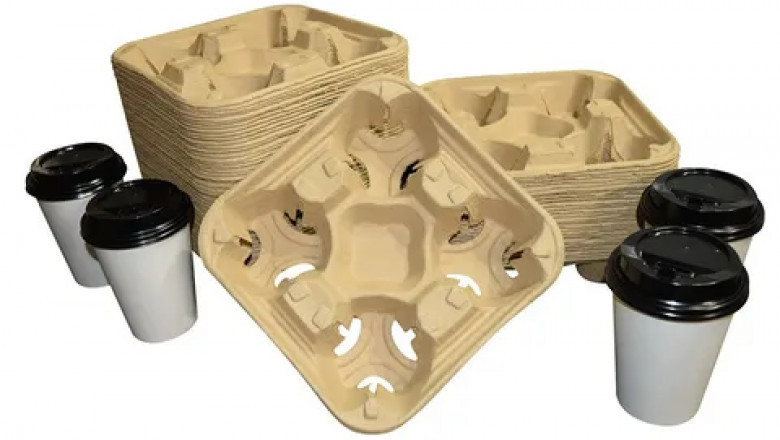views
Sustainability has become one of the most significant priorities for businesses around the globe, particularly when it comes to packaging. Consumers, regulatory bodies, and investors are increasingly demanding more environmentally friendly alternatives, prompting companies to seek out packaging solutions that minimize environmental impact. Among these alternatives, molded fiber has emerged as a powerful contender. This article explores how molded fiber helps companies achieve their sustainable packaging goals, outlining its environmental benefits, versatility, economic advantages, and how it supports corporate responsibility.
What is Molded Fiber and Why is it Sustainable?
Molded fiber, often made from recycled paper, cardboard, and other natural fibers, is an eco-friendly packaging material that’s becoming increasingly popular due to its renewable and biodegradable properties. This material is produced through a process that involves pulping fibers, which are then molded into custom shapes. Molded fiber packaging is not only sustainable, but also lightweight, durable, and highly versatile, which makes it an ideal choice for businesses striving to reduce their carbon footprint.
The sustainability of molded fiber stems from several factors, the most notable being its ability to be recycled and its biodegradability. Unlike plastic, which can persist in the environment for hundreds of years, molded fiber breaks down naturally over time, significantly reducing the burden on landfills. Furthermore, it is often manufactured from post-consumer recycled content, minimizing the need for virgin materials and lowering the overall environmental impact of production.
Reduced Carbon Footprint with Molded Fiber
One of the key reasons companies are turning to molded fiber as a sustainable packaging solution is the reduction in carbon emissions that comes with its production. The process of making molded fiber is less energy-intensive compared to traditional plastic production. This lower energy requirement translates to fewer greenhouse gas emissions, a crucial factor for companies aiming to meet their sustainability goals and reduce their overall carbon footprint.
Additionally, molded fiber is lighter than many plastic alternatives, which further reduces transportation emissions. The lighter weight results in lower fuel consumption during shipping, making it a more sustainable option in terms of logistics. As businesses continue to prioritize reducing carbon emissions across their supply chains, molded fiber packaging provides a practical solution that aligns with these goals.
Versatility of Molded Fiber in Packaging Applications
Molded fiber's versatility makes it an attractive choice for a wide range of industries. Whether it’s food packaging, consumer electronics, or protective packaging for fragile items, molded fiber can be designed to fit a variety of products and needs. This adaptability allows companies to implement sustainable packaging solutions across different sectors without compromising on product protection or presentation.
Moreover, molded fiber can be customized to a variety of shapes and sizes, ensuring that it meets the specific requirements of different products. It can be used to create trays, clamshells, end caps, and even custom molded inserts for delicate items. The ability to mold fiber into a wide range of shapes ensures that companies don’t have to sacrifice functionality or aesthetics when opting for sustainable packaging solutions, making it a perfect fit for eco-conscious brands.
Economic Benefits of Switching to Molded Fiber
Beyond its environmental advantages, molded fiber offers several economic benefits that make it an appealing option for businesses. Initially, businesses might assume that sustainable packaging options like molded fiber are more expensive than traditional packaging materials such as plastic. However, when considering the long-term economic impact, molded fiber often proves to be a cost-effective choice.
Molded fiber packaging is often made from recycled paper products, which can be less expensive to source than virgin plastic. Additionally, as demand for molded fiber packaging increases, economies of scale are likely to reduce production costs. For companies looking to improve their bottom line while enhancing their sustainability efforts, switching to molded fiber can offer a significant return on investment over time, particularly when factoring in savings from reduced waste disposal costs and energy use.
Supporting Corporate Social Responsibility with Molded Fiber
Corporate social responsibility (CSR) has become an essential aspect of modern business practices. Companies are not only expected to be financially profitable but also to contribute positively to society and the environment. Molded fiber helps businesses meet their CSR objectives by offering a packaging material that aligns with environmentally responsible practices. This commitment to sustainability can significantly enhance a company’s brand reputation, making it more attractive to environmentally conscious consumers and investors.
By adopting molded fiber, companies can showcase their dedication to environmental stewardship, transparency, and ethical production practices. This move resonates well with today’s consumers, who are increasingly prioritizing sustainability when making purchasing decisions. Businesses that integrate molded fiber into their packaging strategy not only contribute to a cleaner planet but also create a positive brand image that supports long-term customer loyalty and trust.
Conclusion
Molded fiber is playing a pivotal role in helping companies achieve their sustainable packaging goals. From its ability to reduce carbon footprints to its versatility across industries, this eco-friendly material is an innovative solution for businesses looking to transition away from harmful plastic packaging. Furthermore, the economic benefits, including cost savings and improved CSR, demonstrate that molded fiber is not just good for the environment but also for a company's bottom line. As consumer demand for sustainable products continues to rise, molded fiber offers companies an effective, environmentally responsible, and economically viable packaging option that supports a greener future for all.
By embracing molded fiber, businesses can take an active role in reducing waste, conserving resources, and achieving their sustainability targets, all while enhancing their market position as leaders in eco-conscious innovation.














Comments
0 comment